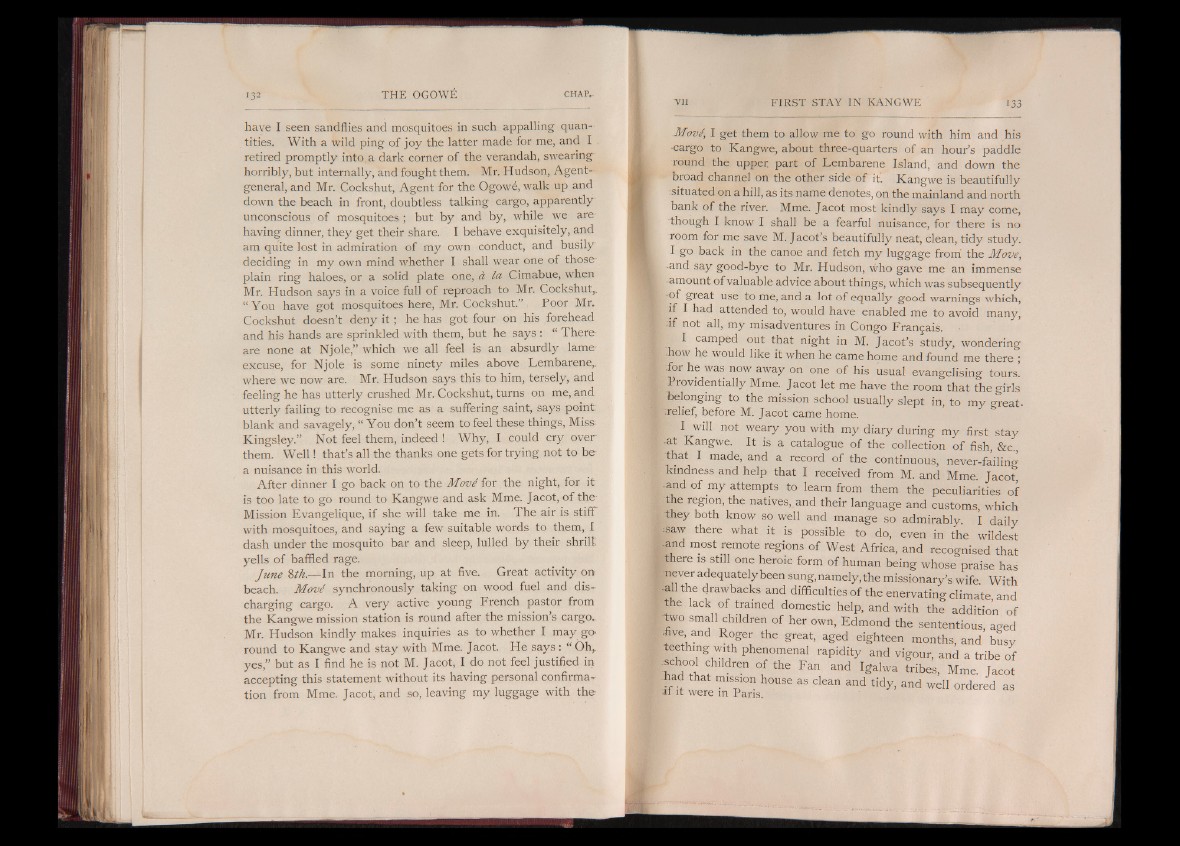
have I seen sandflies and mosquitoes in such appalling quantities.
With a wild ping of joy the latter made for me, and I
retired promptly into a dark corner of the verandah, swearing
horribly, but internally, and fought them. Mr. Hudson, Agent-
general, and Mr. Cockshut, Agent for the Ogowd, walk up and
down the beach in front, doubtless talking cargo, apparently
unconscious of mosquitoes ; but by and by, while we are
having dinner, they get their share. I behave exquisitely, and
am quite lost in admiration of my own conduct, and busily
deciding in my own mind whether I shall wear one of those-
plain ring haloes, or a solid plate one, a la Cimabue, when
Mr. Hudson says in a voice full of reproach to Mr. Cockshut,.
“ You have got mosquitoes here, Mr. Cockshut. Poor Mr.
Cockshut doesn’t deny i t ; he has got four on his forehead
and his hands are sprinkled with them, but he says : “ There
are none at Njole,” which we all feel is an absurdly lame-
excuse, for Njole is some ninety miles above Lembarene,.
where we now are. Mr. Hudson says this to him, tersely, and
feeling he has utterly crushed Mr. Cockshut, turns on me, and
utterly failing to recognise me as a suffering saint, says point:
blank and savagely, “ You don’t seem to feel these things, Miss;
Kingsley.” Not feel them, indeed ! Why, I could cry over
them. W e ll! that’s all the thanks one gets for trying not to be-
a nuisance in this world.
After dinner I go back on to the Move for the night, for it
is too late to go round to Kangwe and ask Mme. Jacot, of the
Mission Evangelique, if she will take me in. The air is stiff
with mosquitoes, and saying a few suitable words to them, I
dash under the mosquito bar and sleep, lulled by their shrill;
yells of baffled rage.
June ?>th.— In the morning, up at five. Great activity on
beach. Movi synchronously taking on wood fuel and discharging
cargo. A very active young French pastor from
the Kangwe mission station is round after the mission’s cargo.
Mr. Hudson kindly makes inquiries as to whether I may go-
round to Kangwe and stay with Mme. Jacot. He says : “ Oh,
yes,” but as I find he is not M. Jacot, I do not feel justified in
accepting this statement without its having personal confirmation
from Mme. Jacot, and so, leaving my luggage with the
.Mové\ I get them to allow me to go round with him and his
•cargo to Kangwe, about three-quarters of an hour’s paddle
round the upper, part of Lembarene Island, and down the
broad channel on the other side of it. Kangwe is beautifully
situated on a hill, as its name denotes, on the mainland and north
bank of the river. Mme. Jacot most kindly says I may come,
though I know I shall be a fearful nuisance, for there is no
room for me save M. Jacot’s beautifully neat, clean, tidy study.
I go back in the canoe and fetch my luggage from the Move,
•and say good-bye to Mr. Hudson, who gave me an immense
amount of valuable advice about things, which was subsequently
o f great use to me, and a lot of equally good warnings which,
I i f I had attended to, would have enabled me to avoid many,
-if n°t aT rny misadventures in Congo Français.
I I camped out that night in M. Jacot’s study, wondering
'how he would like it when he came home and found me there ;
.for he was now away on one of his usual evangelising tours.
Providentially Mme. Jacot let me have the room that the girls
belonging to the mission school usually slept in, to my great,
.relief, before M. Jacot came home.
î f l will not weary you with my diary during my first stay
-at Kangwe. It is a catalogue of the collection of fish, &c.,
that I made, and a record of the continuous, never-failing
kindness and help that I received from M. and Mme. Jacot,
-and of my attempts to learn from them the peculiarities of
the region, the natives,, and their language and customs, which
|fhey both know so well and manage so admirably. I daily
:saw there what it is possible to do, even in the wildest
-and most remote regions of West Africa, and recognised that
■fcere is still one heroic form of human being whose praise has
■fiver adequately been sung, namely, the missionary’s wife. With
■lithe drawbacks and difficulties of the enervating climate and
the lack of trained domestic help, and with the addition of
two small children of her own, Edmond the sententious, aged
•five, and Roger the great, aged eighteen months, and busy
ee mg with phenomenal rapidity and vigour, and a tribe of
.-school children of the Fan and Igalwa tribes, Mme. Jacot
Fad that mission house as clean and tidy, and well ordered as
at it were in Paris.